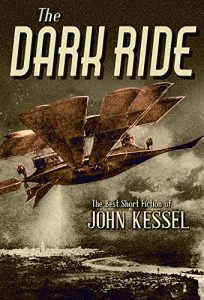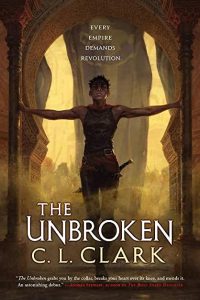Gary K. Wolfe Reviews The Dark Ride: The Best Short Fiction of John Kessel by John Kessel
 The Dark Ride: The Best Short Fiction of John Kessel, John Kessel (Subterranean 978-1-64524-058-7, $45.00, 584pp, hc) June 2022.
The Dark Ride: The Best Short Fiction of John Kessel, John Kessel (Subterranean 978-1-64524-058-7, $45.00, 584pp, hc) June 2022.
In his insightful introduction to The Dark Ride: The Best Short Fiction of John Kessel, Kim Stanley Robinson grapples with the somewhat thorny question of how Kessel’s stories relate to the genres of the fantastic, and at one point he even invokes allegory, citing Kessel’s own musing about what an allegory would read like without the ‘‘understory’’ telling us what we’re supposed to think. Robinson goes on, ‘‘I doubt very much that the young Kessel was thinking in such terms when he came up with these ideas’’ – but then, when we go back at look at Kessel’s very first story collection, Meeting in Infinity way back in 1992, we find that Allegories and Extrapolations was the subtitle. So maybe Kessel has indeed been thinking along these lines for quite a while. That subtitle might suggest something else about the tensions in Kessel’s fiction: ‘‘allegories’’ are of course creatures of traditional literary scholarship, and Kessel is a doctorally certified English professor. ‘‘Extrapolations’’ is just as traditional a term in SF circles, and Kessel is equally at home there, so it shouldn’t be surprising that his stories often hover between these poles, featuring on the one hand moon colonies, time travel, and even space opera, and on the other a whole catalog of literary and cultural figures including Austen, Melville, Wells, Shelley, Swift, Emma Goldman, and – for good measure – Preston Sturges and Marilyn Monroe.
For me, Kessel’s most iconic story, ‘‘The Pure Product’’, draws its title and some of its sensibility from William Carlos Williams, a poet who famously disdained allegory and symbolism (his most famous quotation is probably ‘‘no ideas but in things’’; Kessel’s title comes from Williams’s ‘‘The pure products of America/go crazy’’). Kessel’s blithely amoral time traveler terrorizing his way through 1980s America may be part of what briefly earned Kessel the label of ‘‘savage humanist,’’ and may be related to the anarchic ‘‘Tyler Durden’’ in ‘‘Stories for Men’’, the time-traveling Detlev Gruber of ‘‘Some Like it Cold’’ and ‘‘The Miracle of Ivar Avenue’’ or the professional thieves of ‘‘The Baum Plan for Financial Independence’’. But ‘‘The Pure Product’’ is also a road-trip tale with echoes all the way back to Kerouac. When the narrator notes, ‘‘You lose track of how long you have been on the road, where are you going,’’ he seems to be directly setting us up for the endless road trip of ‘‘Not Responsible! Park and Lock It!’’ whose hapless (and mostly hopeless) characters live their entire lives on superhighways. Like much of Kessel’s most disturbing fiction, it carries just enough SFnal extrapolation to make it almost credible, but is essentially an absurdist parable.
It’s also an implicit critique of familiar aspects of American culture, a theme to which Kessel returns from a variety of angles. That time-traveling meddler and ‘‘talent scout’’ Detlev Gruber, drawn to Hollywood, finds himself involved in the last days of Marilyn Monroe in ‘‘Some Like it Cold’’ and in a pretty nifty mystery involving the director Preston Sturges in ‘‘The Miracle of Ivar Avenue’’, which is the more successful story in part because Sturges’s own cynical/screwball view of America seems be a real influence on Kessel (most evident in his novel Corrupting Dr. Nice). On the other hand, the plight of the American worker is addressed with almost Steinbeck-like realism in ‘‘Buffalo’’, a lovely tribute to Kessel’s father, in which he imagines him meeting an increasingly despairing H.G. Wells, who actually did visit Buffalo when Kessel’s dad worked there. Buffalo also figures prominently in the collection’s newest and arguably most ambitious tale, ‘‘The Dark Ride’’, which centers on Leon Czolgosz, the anarchist who assassinated President McKinley in 1901, during a World’s Fair called the Pan-American Exposition. In addition to a celebration of capitalism and an electrical demonstration by Tesla himself, the fair featured a ‘‘dark ride’’ called ‘‘A Trip to the Moon’’, based on Wells’s First Men in the Moon. In Czolgosz’s fevered mind, his radicalization as a steelworker, an earlier meeting with Emma Goldman, the rather tacky ride with its papier-mâché Selenites, and his plan for the assassination get jumbled into a fantasia in which he helps liberate human slaves on the moon and confronts the Grand Lunar. It’s a complex and rich historical tapestry, even as it gets weighed down by its own research in the latter half.
The classic dilemma of freedom and determinism shows up in the Nebula-winning ‘‘Another Orphan’’, in which a disillusioned commodities analyst in Chicago wakes up to find himself aboard the Pequod, wondering if his life there is predetermined by the fact that he’s apparently inside Moby Dick. Doing Melville is a pretty bold effort for any writer, but Kessel skillfully avoids falling into the trap of mimicry by keeping the protagonist’s point of view contemporary and prudently limiting his interactions with Ahab, which are nevertheless the philosophical center of the story. Clearly, Kessel doesn’t shy away from taking on the classics. ‘‘Gulliver at Home’’ is less about Swift’s wandering adventurer than his long-suffering wife, who finds herself having to cope with Gulliver’s increasing disorientation; by focusing on her as a more-or-less realistic character, Kessel avoids having to mimic Swift’s satirical tone, while bringing off the tricky problem of satirizing a famous satire. But the boldest effort at literary homage is probably the most famous tale here, if only because of its expansion into Kessel’s 2018 novel of the same name. Far from a satirical mash-up, ‘‘Pride and Prometheus’’ is respectful of both Austen and Shelley, and, as Kessel tells us in his story notes, he wisely decided to pitch the tone more toward Shelley (who after all is an SF forebear). Figuring out that the timelines of the two novels are almost close enough to overlap, he constructs a suspenseful tale in which Mary – arguably the most intellectual of Austen’s Bennet sisters – forms a relationship with Victor Frankenstein during his visit to England and Scotland in Shelley’s novel, not knowing the risk it entails. It’s a balancing act brought off with impressive skill.
The other most widely-known of Kessel’s tales is the Tiptree-winning ‘‘Stories for Men,’’ set in the Society of Cousins, a lunar settlement governed by women and disrupted by a charismatic but unhinged media celebrity calling himself Tyler Durden (after the character in Chuck Palahniuk’s Fight Club). The protagonist Erno (whom we later meet in Kessel’s The Moon and the Other) is caught between Durden’s anarchy and his mother’s regimented society. Confused even more by an ancient 1936 anthology called Stories for Men (an actual book, Kessel tells us), he finds himself grappling with conflicting and at times unsavory models of masculinity, while questioning the roles assigned to men by the Society. It’s a thoughtful exploration of male identity still too rare in SF, and one which questions some of the genre’s unexamined assumptions. On the other hand, probably the most purely enjoyable tale – the one which most calls to mind the sharp satirical humor of novels like Corrupting Dr. Nice – is ‘‘Invaders’’, even though it deals with the brutal conquest of the Incas in the 1530s, juxtaposed with a contemporary alien invasion. The aliens – called Krel, right out of Forbidden Planet–have arrived mostly in search of cocaine (and perhaps to collapse world financial markets and quote T.S. Eliot at us). Both narratives are framed by the musings of a science fiction writer who freely acknowledges that SF can be its own sort of addiction, but who manages to figure out a happy ending, even for the Incas. It’s a story that knows it’s a story, and that sort of self-awareness has become a sort of Kessel trademark, whether the literary worlds he visits are brilliant facsimiles (as in ‘‘Pride and Prometheus’’) or surreal fantasias (as in ‘‘The Baum Plan for Financial Independence’’, in which Dorothy Gale is a housebreaker and Oz a kind of dreamland at the end of an underground railway (this some years before Colson Whitehead’s own vision of a literal underground railway, though Kessel’s has nothing to do with slavery). The twenty tales collected here, fewer than in the massive Baen e-book The Collected Kessel of a decade ago (but with some of the same story notes), is as valuable an introduction as we could hope for to one of the field’s most distinctive and insightful literary voices.
Gary K. Wolfe is Emeritus Professor of Humanities at Roosevelt University and a reviewer for Locus magazine since 1991. His reviews have been collected in Soundings (BSFA Award 2006; Hugo nominee), Bearings (Hugo nominee 2011), and Sightings (2011), and his Evaporating Genres: Essays on Fantastic Literature (Wesleyan) received the Locus Award in 2012. Earlier books include The Known and the Unknown: The Iconography of Science Fiction (Eaton Award, 1981), Harlan Ellison: The Edge of Forever (with Ellen Weil, 2002), and David Lindsay (1982). For the Library of America, he edited American Science Fiction: Nine Classic Novels of the 1950s in 2012, with a similar set for the 1960s forthcoming. He has received the Pilgrim Award from the Science Fiction Research Association, the Distinguished Scholarship Award from the International Association for the Fantastic in the Arts, and a Special World Fantasy Award for criticism. His 24-lecture series How Great Science Fiction Works appeared from The Great Courses in 2016. He has received six Hugo nominations, two for his reviews collections and four for The Coode Street Podcast, which he has co-hosted with Jonathan Strahan for more than 300 episodes. He lives in Chicago.
This review and more like it in the May 2022 issue of Locus.
 While you are here, please take a moment to support Locus with a one-time or recurring donation. We rely on reader donations to keep the magazine and site going, and would like to keep the site paywall free, but WE NEED YOUR FINANCIAL SUPPORT to continue quality coverage of the science fiction and fantasy field.
While you are here, please take a moment to support Locus with a one-time or recurring donation. We rely on reader donations to keep the magazine and site going, and would like to keep the site paywall free, but WE NEED YOUR FINANCIAL SUPPORT to continue quality coverage of the science fiction and fantasy field.
©Locus Magazine. Copyrighted material may not be republished without permission of LSFF.







